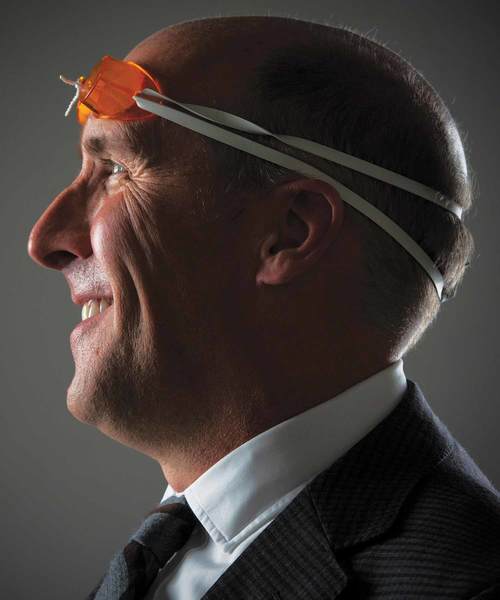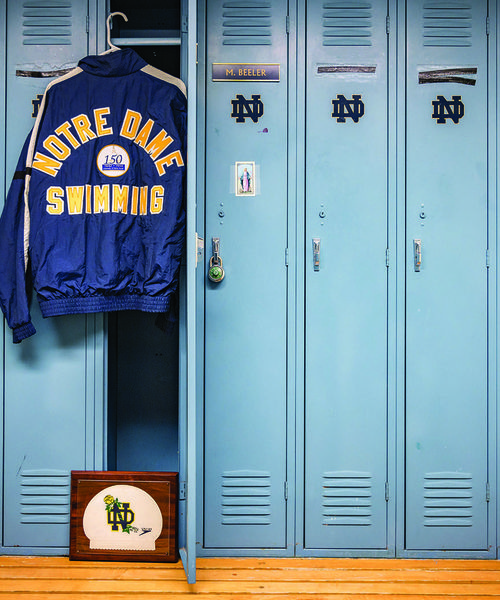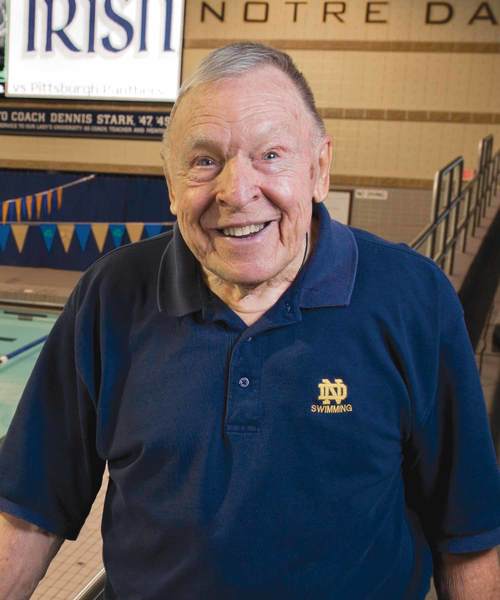
Brian Casey
Making a splash in higher education
Brian Casey keeps a letter in the top drawer of his desk. It’s one of many he received in 2008 when, at age 44, he was appointed the 19th president of DePauw University.
“I don’t read it every day, but I know it’s there,” he says of the “warm, congratulatory” note that came from a man he had admired since his days as an undergrad at the University of Notre Dame, and in whose footsteps he had found himself following.
“When I think about my own work now, running a university, I think about Father Hesburgh,” Casey says, referring to Rev. Theodore M. Hesburgh, C.S.C., Notre Dame’s president emeritus and the author of the special letter. “I think about it more often than I really expected to, actually. It surprises me how much he still plays in my mind when I think about my work now.”
Casey’s path to the top job at the small liberal arts college in Greencastle, Ind., began in a somewhat unlikely place—the swimming pool. As a 200-meter butterflyer and the 1985 captain of the Notre Dame swimming team, the New Jersey native honed his leadership skills and came to understand the true meaning of persistence as an undergraduate.
“I learned how to manage intensity at Notre Dame,” he says, recalling early mornings trudging across a frozen South Quad to plunge into the chilly waters of the Rockne Memorial pool. “You have to train so hard. I remember day after day, morning after morning, walking in the pitch black, in the freezing cold. The last thing you want to do is dive into a cold pool, just doing it day in and day out.”
And then he’d go back and do it again later that day. “But it was never grim,” he adds. “It was always fun. I loved my teammates and I was inspired by them, challenged by them.”
Motivated by friendly competition—and his own determination—Casey excelled as a student-athlete on both counts of the phrase, earning the University’s “Scholar-Athlete of the Year” honor as a senior. All the while, he was keeping an eye on the Main Building, intrigued and a bit in awe of the man leading the charge.
“Father Hesburgh was this larger-than life character and he literally embodied the entire institution and its aspirations,” he says. “So I recall being on a campus where there was this person who was striving to move the place forward. I often think about Father Hesburgh now, that I’m in a very small way engaged in a career that was his career, and trying to do the same things at another institution that he was trying to do at Notre Dame.”
A double major in philosophy and economics, Casey excelled academically. He was elected to Phi Beta Kappa, earned the Economics Award for the highest grade-point average in the subject, and graduated summa cum laude. In addition to his scholarly pursuits, he also learned something important about himself along the way.
“I remember being fascinated by the buildings that were going up on campus at the time and by the institution’s trajectory…in a way that my roommates weren’t,” he says. “They weren’t as interested in the nuts and bolts and details of administrative challenges and policies that I weirdly was.”
It was at that point that he might have found his calling. “I loved being on a campus and I needed to build a life for myself on a campus,” he says. “Everything followed from that. That was the one thing that was true, and I just started building from there.”
His affinity for higher education first led him back to the classroom—to Stanford, where he graduated with honors from law school in 1988, and then, after practicing law on Wall Street, to Harvard to earn his doctorate in the history of American civilization with a focus on the history of American higher education and American intellectual history. His first administrative appointment followed at Brown University, where he served as assistant provost, leading academic planning across the arts and sciences. Harvard came calling in 2005 and he returned to the scene of his Ph.D. as associate dean for academic affairs in the faculty of arts and sciences, where he remained until the DePauw opportunity came along.
“When I was told about the position, I was 43,” he says. “I thought, ‘They’ll never hire me,’ but I threw my hat in the ring and lo and behold, they offered me the job.”
With enthusiasm. In announcing his appointment, DePauw trustee Sarah Reese Wallace said of Casey: “He is an astute academic planner and champion of faculty, and his personal magnetism—whether in speaking to a large group or in one-on-one conversations—is contagious.”
Since taking the helm at DePauw, he has worked tirelessly to champion the cause of a liberal arts education, leading at a time when colleges and universities are being challenged to reexamine their priorities and maximize resources in the face of an ever-changing economic landscape. While his focus is squarely on his own institution, he does keep an eye on Notre Dame, cheering its successes as it grows and evolves, at the same time hoping it will remain in many ways the same.
“I try to be objective about it, but I’m proud of what Notre Dame has done,” he says of his alma mater. “It’s clear to me that Notre Dame is stronger now than it was when I graduated in 1985. The breadth and reach of the University, the quality of its research, the place it holds within American higher education, those are all stronger than they were. So I’m proud of the institution, its ambition, and its ability to execute against that ambition.
“It will be a challenge for Notre Dame to keep the warm, community-building aspects of its undergraduate education and development as it seeks to expand its research and graduate school programs, but it seems to be doing it well,” he adds.
Casey returns to campus from time to time, usually to visit his nieces who are Notre Dame students (both 200-butterflyers, perhaps not entirely coincidentally).
“The campus looks strikingly different than it did when I was there,” he observes. “It’s like the old campus has been wrapped with a new campus, but it all still feels very Notre Dame to me.”
He tries to keep in touch with Notre Dame friends old and new, among them the University’s current president, Rev. John I. Jenkins, C.S.C., who, like his predecessor Father Hesburgh, also reached out to Casey with congratulations on his DePauw appointment.
“Father John has been a friend since I’ve taken this position and I seek his counsel and take it when it comes,” he says. “He’s very busy and I’m very busy, but we try to see each other at least once a year and we exchange Christmas presents and cards. He’s been a confidant and a friend.”
For those who know Casey best, his career choice has come as no surprise.
“My brother said to me recently, ‘When you were a little kid you realized you liked school and swimming. And you’re still doing exactly that,’” he says, noting that he does regularly suit up and dive into the pool with the DePauw teams.
“It’s really fun being president of a school that has a swim team,” he says, quickly adding, “and yes, I can keep up with them still.”
As Casey drives DePauw forward, he is ever mindful of where he’s been, and always on the lookout for good ideas to take home with him.
“At one of my niece’s graduation at Notre Dame a couple years ago, I was occasionally jotting things down in a little notebook and my brother said, ‘You’re going to take that and do it at DePauw.’ I told him, ‘Absolutely.’ I’m more than happy to borrow traditions from other places.”
He also would like to borrow Father Hesburgh at some point, to bring him to DePauw for a certain item of business. “I’ve been trying to give this man an honorary degree for the past four years,” he says. “DePauw and Notre Dame always seem to have commencement on the same day, so it’s been a challenge.”
In other words, consider it done. Because if we know anything about Brian Casey, it’s that he’s always up for a challenge.

